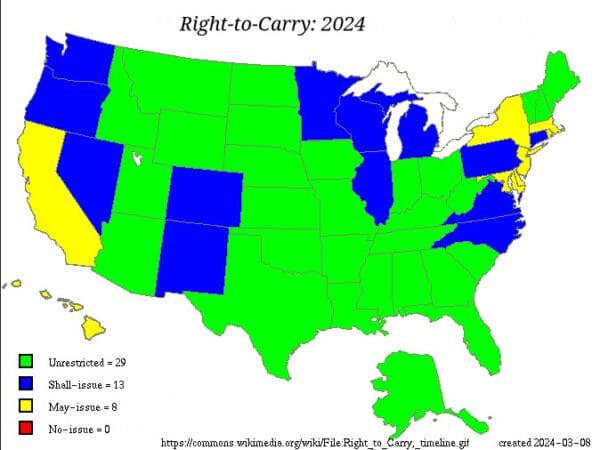
The Idaho Attorney General has joined with the Attorney General of Indiana and 26 other state AGs or Legislatures to file an amicus brief in the case of Bevis v City of Naperville.
On November 22, 2023, the Court of Appeals for the Seventh Circuit denied the petition for an injunction pending appeal to en banc review or for a writ of certiorari to the Supreme Court. On December 20, the request for an en banc hearing is denied. On March 8, 2024, a petition asking for a stay of proceedings pending a Supreme Court appeal is granted.
The case focuses on whether the State of Illinois has the power to ban an entire class of semi-automatic firearms.
From the press release by Idaho AG Labrador:
Attorneys General Raúl Labrador of Idaho and Todd Rokita of Indiana led 26 other states in filing a brief with the United States Supreme Court challenging Illinois’ unconstitutional ban of AR-15 rifles and their standard 30-round magazines.
“This ruling from the Seventh Circuit flies in the face of the Bruen decision and the Second Amendment’s unqualified command,” said Attorney General Labrador. “To restrict an inanimate object based on nothing more than cosmetic appearance is absurd, and the Supreme Court needs to make this right with all expediency.”
The Seventh Circuit’s decision in Barnett v. Raoul found the Illinois gun ban constitutional, holding that the plain language of the Second Amendment and the term “Arms” does not apply to AR-15s because of their militaristic appearance. The Seventh Circuit’s decision lacks any textual or historical basis. In fact, the arms the Second Amendment originally protected were those used in military combat. The Seventh Circuit’s analysis bears no resemblance to the analysis prescribed by the Supreme Court of the United States.
The brief asks the Supreme Court to grant certiorari and correct the Seventh Circuit’s erroneous decision, arguing that “[e]ven apart from having no basis in the text of the Second Amendment, the Seventh Circuit’s artificial divide between “militaristic” firearms and firearms used for self-defense is indefensible.”
The 26 other states joining Idaho and Indiana are:
Alabama, Alaska, Arkansas, Florida, Georgia, Iowa, Kansas, Kentucky, Louisiana, Mississippi, Missouri, Montana, Nebraska, New Hampshire, North Dakota, Ohio, Oklahoma, South Carolina, South Dakota, Texas, Utah, Virginia, West Virginia, Wyoming, and the State Legislatures of Arizona and Wisconsin.
Astute observers may notice an amazing overlap between this list and states that are members of the Constitutional Carry (permitless) club. In the above list, there are only two states that are not Constitutional Carry or permitless club members. They are Virginia and Wisconsin. Maine and Vermont are the only Constitutional Carry (permitless) states that did not join the amicus brief.

Such amicus briefs are becoming more common. At stake are two visions of how the Constitution is to be regarded.
The governments of Idaho, Indiana, and roughly 26 other states generally subscribe to the ideology the Constitution is a contract between the population, the States, and the federal government. The contract should be interpreted as it was understood to be at the time the Constitution and the Bill of Rights were ratified.
Approximately 18-20 other state governments have a different vision of the Constitution. In this vision, the Constitution of 1787 (Bill of Rights in 1791) is/are outdated. The interpretation of the Constitution should be by Progressives who look to bend Constitutional provisions to their understanding of what is best for the Country based on the current situation.
These two visions are not necessarily in conflict. In practice, they are nearly always in conflict. The vision of those who wish to exert power over the population and concentrate it in the federal government runs directly contrary to the structure of the Constitution as written, with its checks and balances, division of power, and limitation on the power of the federal and state governments.
About Dean Weingarten:
Dean Weingarten has been a peace officer, a military officer, was on the University of Wisconsin Pistol Team for four years, and was first certified to teach firearms safety in 1973. He taught the Arizona concealed carry course for fifteen years until the goal of Constitutional Carry was attained. He has degrees in meteorology and mining engineering, and retired from the Department of Defense after a 30 year career in Army Research, Development, Testing, and Evaluation.

from https://ift.tt/IuqEPnx
via IFTTT

No comments:
Post a Comment